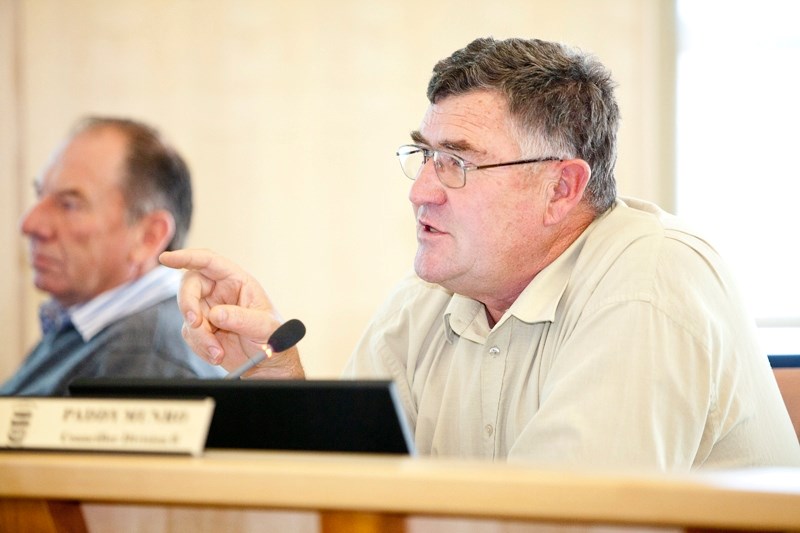A provincial advisory body on the Red Deer River watershed appears to be no more than a “propaganda machine” for industry, Mountain View County councillor Paddy Munro charged last week.In a scathing report to council's policies and priorities committee on Wednesday, Munro (Div. 6) said the Red Deer River Watershed Alliance has systematically ignored the impacts of hydraulic fracturing and logging on the watershed.“I see no reason for municipal governments to fund what appears to be a public relations stunt (and) a PR campaign against its citizens' own best interests,” Munro said.The group's State of the Watershed Report, a 900-page document on the watershed's environmental integrity completed in 2009, does not even contain a section on the impact of forestry, he said.“When you have an industry that takes a million cubic metres a year off the eastern slope, it should be mentioned. It's a data gap.”But it's the group's virtual silence about fracking that Munro said concerns him the most.The report, he said, cites outdated oil production data suggesting that surface water use by the industry is expected to decline by five per cent each year.“Fracking is the biggest deal in oil and gas in its history. In the United States it's the hottest topic going. It's an environmental catastrophe and the American government has encouraged it for energy independence.”More than 1,000 cases of groundwater contamination have been documented by courts and state and local governments in Colorado, Wyoming and Pennsylvania, he said, adding that areas in those states have been labelled part of the National Sacrifice Zone.“I don't want Harmattan, Eagle Valley and Eagle Hill to be called the Sacrifice Zone 10 years from now,” Munro said.“We're talking about billions and billions of dollars in shale gas and shale oil. I don't believe we're ever going to stop it but we've got to get some proper environmental controls.”With industry officials being the “dominant” players on the watershed alliance's board of directors, the group “may represent nothing more than a public relations exercise with a predetermined outcome,” he said.Munro, who has served as county rep at Watershed Alliance meetings, made his comments in advance of an RDRWA delegation to council scheduled for this Wednesday. The county has funded the group at 50 cents per capita – or just over $6,000 – but this year deferred the funding request due to concerns about its effectiveness.Created under the Alberta government's Water for Life Strategy in 2005 as a planning and advisory council for the Red Deer River watershed, the RDRWA receives 80 per cent of its funding from the province and 20 per cent from municipalities within the region.Asked by Reeve Bruce Beattie whether he believes municipalities are included “just to give the appearance of legitimacy,” Munro said, “Absolutely. By having us participate it gives them credibility.”Going forward, he added, “we could say to the watershed alliance that our money could only be used to fund data gaps (but) the credibility thing is a real big deal. It's so serious I can't stress how I feel about this. When you get an industry and Alberta Environment-led propaganda machine, that concerns us.”Div. 7 Coun. Al Kemmere said he wanted to hear what the RDRWA delegation would say to council this week, “but I'd like to see a stronger municipal involvement.”Div. 1 Coun. Kevin Good said he felt the opposite way, as that “would only legitimize” the group's activities.“My perspective is we don't wanna be involved in a propaganda machine. We don't wanna support it with our involvement, or increased involvement,” Good said.“It's through involvement that you engender change,” Beattie replied. “You have to determine whether you can change it from within or not … What we have to figure out is how do we effectively change the direction, whether it's the logging in the West Country, which I think has caused a lot of the flood events, or with the fracking.“We have to make that organization more effective, I agree, or we cut our losses and get behind some other group,” Beattie said.In a message from RDRWA chairman Tom Daniels posted on the group's website, Daniels describes the watershed report as “a major milestone” but acknowledges that “one of the biggest challenges in completing this document was trying to keep the focus on only those indicators for which there was actual measurement data available. Unfortunately data was not available for many concern areas, especially those associated with groundwater.”Daniels, forestry superintendent with West Fraser Timber Co. Ltd., adds that “continued effort will be put towards trying to quantify the data gaps, but in most cases this is a costly endeavour for which the RDRWA will be looking for partners to help support the data collection required. In the meantime, there are many indicators for which management plans can be developed.”In addition to Daniels, Munro identified RDRWA treasurer Craig DeCoursey of TAQA North Ltd. and Phil Boehme of Alberta Environment as the “dominant” directors on the RDRWA board.



